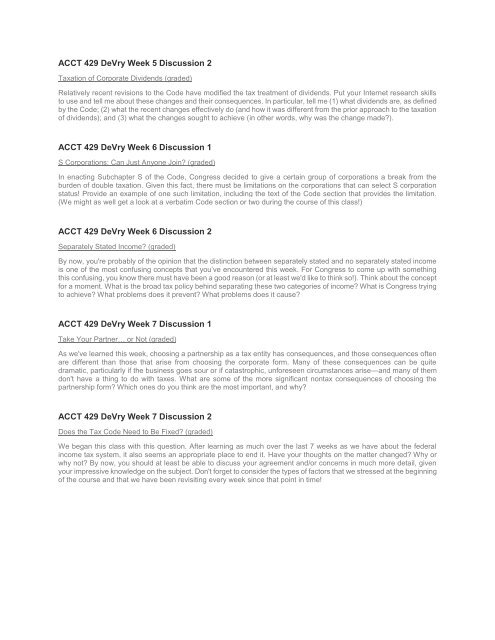ACCT 429 DeVry All Week Discussions
You also want an ePaper? Increase the reach of your titles
YUMPU automatically turns print PDFs into web optimized ePapers that Google loves.
<strong>ACCT</strong> <strong>429</strong> <strong>DeVry</strong> <strong>Week</strong> 5 Discussion 2<br />
Taxation of Corporate Dividends (graded)<br />
Relatively recent revisions to the Code have modified the tax treatment of dividends. Put your Internet research skills<br />
to use and tell me about these changes and their consequences. In particular, tell me (1) what dividends are, as defined<br />
by the Code; (2) what the recent changes effectively do (and how it was different from the prior approach to the taxation<br />
of dividends); and (3) what the changes sought to achieve (in other words, why was the change made?).<br />
<strong>ACCT</strong> <strong>429</strong> <strong>DeVry</strong> <strong>Week</strong> 6 Discussion 1<br />
S Corporations: Can Just Anyone Join? (graded)<br />
In enacting Subchapter S of the Code, Congress decided to give a certain group of corporations a break from the<br />
burden of double taxation. Given this fact, there must be limitations on the corporations that can select S corporation<br />
status! Provide an example of one such limitation, including the text of the Code section that provides the limitation.<br />
(We might as well get a look at a verbatim Code section or two during the course of this class!)<br />
<strong>ACCT</strong> <strong>429</strong> <strong>DeVry</strong> <strong>Week</strong> 6 Discussion 2<br />
Separately Stated Income? (graded)<br />
By now, you're probably of the opinion that the distinction between separately stated and no separately stated income<br />
is one of the most confusing concepts that you’ve encountered this week. For Congress to come up with something<br />
this confusing, you know there must have been a good reason (or at least we'd like to think so!). Think about the concept<br />
for a moment. What is the broad tax policy behind separating these two categories of income? What is Congress trying<br />
to achieve? What problems does it prevent? What problems does it cause?<br />
<strong>ACCT</strong> <strong>429</strong> <strong>DeVry</strong> <strong>Week</strong> 7 Discussion 1<br />
Take Your Partner… or Not (graded)<br />
As we've learned this week, choosing a partnership as a tax entity has consequences, and those consequences often<br />
are different than those that arise from choosing the corporate form. Many of these consequences can be quite<br />
dramatic, particularly if the business goes sour or if catastrophic, unforeseen circumstances arise—and many of them<br />
don't have a thing to do with taxes. What are some of the more significant nontax consequences of choosing the<br />
partnership form? Which ones do you think are the most important, and why?<br />
<strong>ACCT</strong> <strong>429</strong> <strong>DeVry</strong> <strong>Week</strong> 7 Discussion 2<br />
Does the Tax Code Need to Be Fixed? (graded)<br />
We began this class with this question. After learning as much over the last 7 weeks as we have about the federal<br />
income tax system, it also seems an appropriate place to end it. Have your thoughts on the matter changed? Why or<br />
why not? By now, you should at least be able to discuss your agreement and/or concerns in much more detail, given<br />
your impressive knowledge on the subject. Don't forget to consider the types of factors that we stressed at the beginning<br />
of the course and that we have been revisiting every week since that point in time!

















